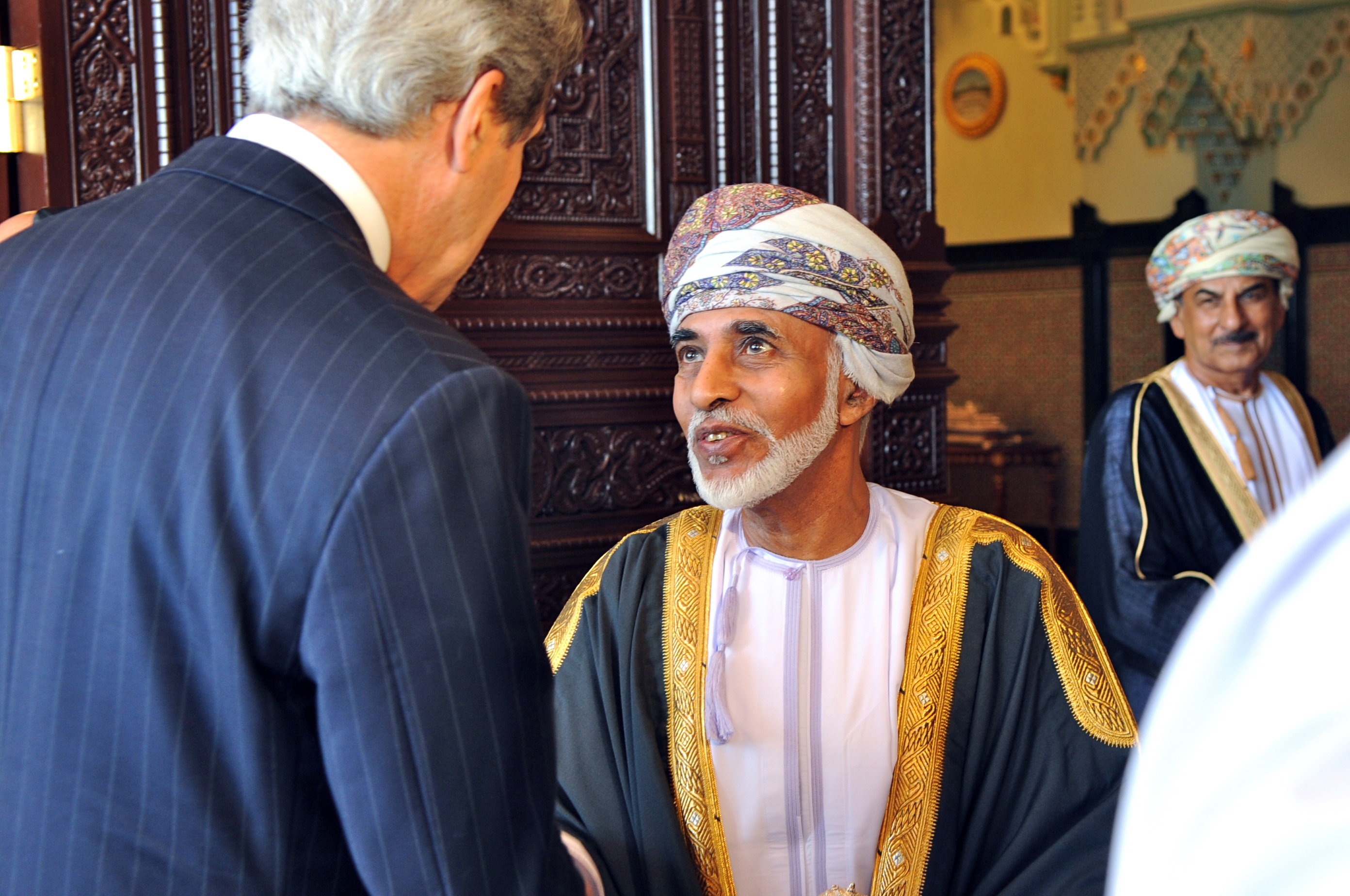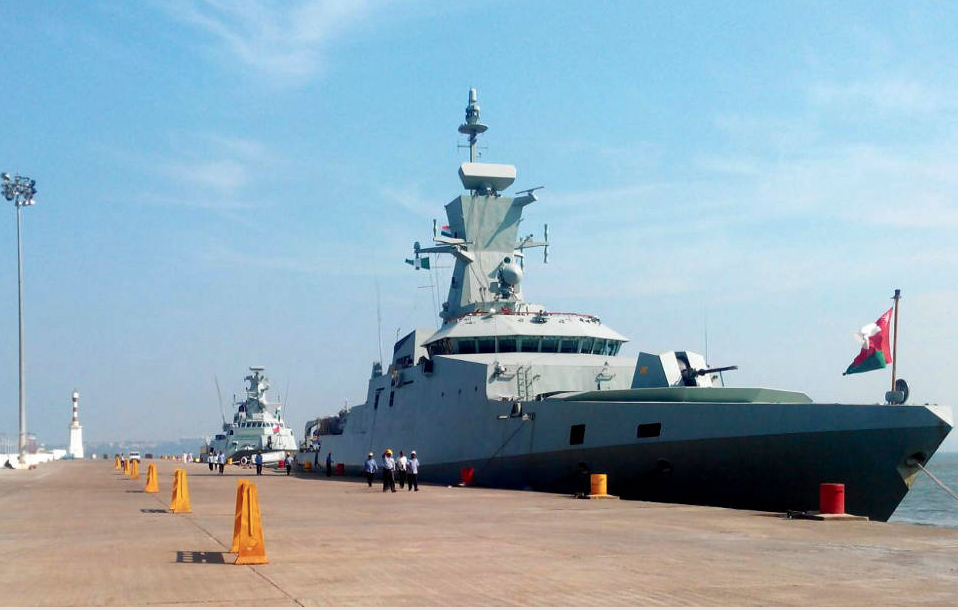Amid a looming succession question concerning the current sultan, Mark Curtis reviews how the Gulf state became, in effect, a giant British military and intelligence base.

View of Muscat, Oman, circa 1902. (Internet Archive Book Images, via Wikimedia Commons.)
By Mark Curtis
British Foreign Policy Declassified
 Sixty years ago, Britain won a long-forgotten war in Oman, setting the special relationship between the two countries that is still being boosted today.
Sixty years ago, Britain won a long-forgotten war in Oman, setting the special relationship between the two countries that is still being boosted today.
The anniversary falls as the head of the British army recently visited Oman, and as the two countries signed a “Comprehensive Joint Declaration on Enduring Friendship” and a new Joint Defence Agreement. Last year, the two cooperated on the U.K.’s largest military exercise in the Middle East in 20 years.
The U.K.’s growing support for Oman’s ruler, Sultan Qaboos, is as extensive as it is ignored in the British media. But a key question looms: who will succeed the sultan after his death, and will London then continue this special relationship?
The 1957-9 war in central Oman defeated an uprising threatening the rule of Sultan Said bin Taimur, one of the most repressive regimes ever seen in the Middle East. Declassified files show Britain’s chief diplomat in the region, George Middleton, recognizing that: “The condition of the people is miserable, the Sultan is unpopular, there is no central administration … and, under the present regime, not a great deal of hope for the future.”

Sultan of Oman Qaboos bin Said Al Said meeting with U.S. Secretary of State John Kerry in Muscat, Oman, 2013. (U.S. State Department)
But that didn’t stop Britain from coming to the aid of the sultan, who kept hundreds of slaves at his palace in Salalah, deploying the Royal Air Force (RAF) to bomb the rebels from the air “to show the population the power of weapons at our disposal” and to convince them that “resistance will be fruitless and lead only to hardship,” the files show.
Former Prime Minister Harold Macmillan approved the bombing of water supplies and agricultural gardens – civilian targets that constitute war crimes – to “deter dissident villages from gathering their crops” and to promote “denial of water supply to selected villages by air action.” The Special Air Service was also deployed in late 1958 and captured the rebels’ final stronghold the following year.
The rebellion that broke out a few years later in Dhofar province in southern Oman also prompted British intervention. The Dhofar uprising was “an indigenous rebellion against the repression and neglect” of the sultan, the Foreign Office later privately noted.
With barely any schools or health facilities in the country, even by 1970 it was forbidden to smoke in public, to play football, to wear glasses, or to talk to anyone for more than 15 minutes. The sultan’s response to the uprising was to use even greater force – largely from British officers, who controlled Oman’s military.
When the British realized the sultan might not win the Dhofar war, their military advisers in Muscat overthrew him in a palace coup in 1970 and installed in power his son, Qaboos, who has remained there ever since. Oman became, in effect, a giant British military and intelligence base.
Files leaked by Edward Snowden show that Britain’s GCHQ has a network of three spy bases in Oman – codenamed Timpani, Guitar and Clarinet – which tap in to various undersea cables passing through the Strait of Hormuz into the Arabian Gulf.

These bases intercept and process vast quantities of emails, telephone calls and web traffic. The information is then shared with the U.S. National Security Agency.
Britain has just established a large, new military base at the Duqm port complex in central Oman, which will house the two 65,000-tonne aircraft carriers being built for the Royal Navy. This will provide “a strategically important and permanent maritime base east of Suez, but outside of the Gulf” and “serve as a staging post for U.K. Carrier Strike Group deployments across the Indian Ocean.”
A new Omani-British Joint Training Area is also being established in Oman this year to facilitate a permanent British army presence in the region. The relationship is solidified, as ever, by arms exports: Oman imported $2.4 billion worth of arms during 2014-18, of which the U.K. was the largest supplier
Growing Commercial Interests

Costa Victoria and the surrounding Port Sultan Qaboos in Muscat, Oman, as seen from another cruise ship. (DXR, CC BY-SA via Wikimedia Commons)
British commercial interests in Oman are also growing, especially in oil and gas, which accounts for 30 percent of Oman’s GDP. Shell has a 34 percent interest in the Petroleum Development Corporation, which manages the country’s oil, while BP has a 60 percent interest in the massive Khazzan gas project, in which it has invested $16 billion.
These interests are tying the U.K. still further to the sultan’s regime, which is authoritarian and repressive even by Gulf standards. Political parties are banned and political meetings are likely to result in arrests. Although Oman has elections to its lower house, the body is largely toothless.
Sultan Qaboos formally holds the positions of prime minister, commander-in-chief of the armed forces, chairman of the central bank, and minister of defense, foreign affairs and finance.
While Oman has made major economic progress in recent decades, portraying it as a benign dictatorship is misleading. In 2014, a UN special rapporteur described a “pervasive culture of silence and fear affecting anyone who wants to speak and work for reforms in Oman.”
Last year, Oman introduced a new penal code that contains harsh penalties against free speech and other rights, and gives sweeping powers to authorities. It provides for jailing anyone who publishes material that poses “a challenge to the rights of the Sultan and his prerogatives, or disgraces his person” or which “undermine the stature of the State.”
Human Rights Abuses
Britain’s active support for the sultan’s regime was confirmed in 2017, when Middle East Eye revealed that the Police Service of Northern Ireland had run programs training Oman’s police, military and special forces in how to manage strikes and protests.
London remains silent on Oman’s human rights abuses, while stressing their “exceptionally close relationship.” Indeed, when the recently-sacked U.K. defense secretary, Gavin Williamson, was in Oman in February 2019, he praised the “statesmanship, the knowledge, the wisdom” of the sultan, even describing him as a “visionary.”
Alan Duncan, a British foreign minister, is a regular guest of the sultan and has visited Oman 24 times since 2000, according to the British parliament’s register of financial interests. These trips have been mainly paid by the sultanate. Three visits have taken place since Duncan became minister of state in July 2016.
But will Britain maintain its special relationship when the current sultan dies? Qaboos, who is 78 and has suffered from colon cancer since 2014, has no heirs and has not formally designated a successor. Oman’s Basic Law stipulates that the next leader must be a male descendant of Sayyid Turki bin Said bin Sultan, the sultan of Muscat and Oman from 1871-88.
The two most commonly mentioned frontrunners are Qaboos’ cousin, Sayyid Asaad bin Tariq al Said, and the latter’s son, Taimur.
Business as Usual
Asaad, the deputy prime minister, regularly meets foreign diplomats on behalf of Qaboos and is believed to be the most likely successor. Asaad was, like Qaboos himself, trained at the U.K.’s military training center at Sandhurst in the 1970s before becoming an army commander.
Taimur, who is just 39, was described in a U.S. State Department cable, revealed by WikiLeaks, as “personable, affable and informal.” He studied for four years in the U.K., in Brighton, Galashiels in Scotland and London.
The U.K. will be using its connections with the coterie surrounding its current placeman in Muscat to help ensure more of the same upon Qaboos’s passing.
Britain’s exit from the European Union is prompting the British government to seek ever closer relations with its longstanding allies in the Gulf. This will continue to be at the expense of promoting positive political and economic change in the region.
Mark Curtis is an historian and analyst of U.K. foreign policy and international development and the author of six books, the latest being an updated edition of “Secret Affairs: Britain’s CollU.S. ion with Radical Islam.”
This article is from his website, British Foreign Policy Declassified.

First class reportage by Mark Curtis. He has shown again how British governnments would do business with the devil if it meant profits.
With all the focus on the Mideast I had seen no mention of Oman until last week When I heard a Saudi apologist mention Oman as the way Iran may be slipping arms to the Houthis. So this is a welcome article. But, no mention of Omani relationships with the rest of the Mideast?
I wonder if the British dignitaries and businessmen keep slaves in their Omani residences?
Today in Jerusalem the USA, Russia and Iran will agree about the fate of war against Iran.
Arayik Sargsyan, academician, President of Academy of Geopolitics, Representative of AIC in the Middle East. https://hayacq.com/42704–.html
https://www.youtube.com/watch?v=wh8tRR9EXIc
Excellent information here, much appreciation. Thank you.
Once again the imperialist boot and “know your master” scheme. Congratulations, Britain, on returning toward Empire and Global Cop.
One minor further note, pointed out recently by Pepe Escobar, is there are no “international waters” at the Strait of Hormuz with the current drone incident. The waters either belong to Oman or to Iran. Air or water traffic is therefore hosted by these countries. To run a military drone, plus accompanying manned aircraft, through this area is of course dangerous and provocative, while blaring it’s Iran as the aggressor etc. etc.
Brazen, careless, arrogant, stupid–the hypocrisy mounts exponentially on these “cradle of liberty” nations.
An excellent article and the comments too. I had no idea of any of this, but unfortunately, cannot be surprised. To think that so many “journalists” not only act in compliance with the official line we do hear, but people like Assange and Snowden are denigrated for letting us know what all the public in the UK, USA etc NEED to know about their rulers past and present.
Thank you Mr.Curtis for this revealing article.You would never read this in the corporate media.Here in Germany Oman is presented as a beautiful travel country that is about to turn into a modern country.I think some”state of the art” research laboratories recently opened.But nothing about her history and repressive regime nor her importance for the British military.
Thank you Mr Curtis – as someone born in the UK over 70 years ago, disgracefully, I had no idea about this particular “relationship” and what the Brit governments (clearly including the Wilson Labour and later ones) have done to ensure that the Omani population remain completely oppressed. I do believe that Oman adjoins Yemen – which only adds to the horror of what the Brits are involved in there.
Is there no awfulness that we westerners will not commit? While I am completely against so called “humanitarian interventions,” (bombing, chaos, destruction, coups, ‘orange revs’) bringing so-called “democracy” to repressed peoples, that does not mean we should help such regimes (yes, regime is the right word here) by slaughtering the people, by selling them weaponry, by *supporting* and/or *ignoring* the very behaviors, actions that we condemn in other nations – those bugaboo ones, that is.
Odd how we the hoi polloi never get to hear – even as a “history” moment – on NPR or BBC or see on PBS – anything about such western criminal acts on civilian populations. Meanwhile we get reprises (often distorted Orwellian style) about, for example, Tianenmen Square. Or we have repeated pieces about the Hong Kong demos against the extradition treaty – from the demonstrators POV of course. (Only China’s name is mentioned, yet so far as I’m aware this treaty also includes extradition to Taiwan for criminals.)
(And oddly enough – there is generally silence, at least on NPR and BBC, about the Gilets Jaunes demos – unless they can denigrate them with “property destruction.”)
My appreciation to Mark Curtis and CN for this short, crash course on Brit-Oman relations.
It is not surprising the Brit public knows little or nothing about Brit military and “intelligence” operations from the late 1950s.
Indeed, the U$ public is equally uniformed about what really happened in Korea, during the war waged against that nation replete with similar bombings of water supplies and agricultural areas, even to the use of biological and chemical warfare.
Most U$ians still know little about what happened in Iran in 1953, thus there is little public perspective about Iran or the Korean Peninsula. All the better to cheer on hostility and, possibly, war.
As well, it is no wonder that the Brits are “on board” with the hard line on Iran, which is just across the Strait of Hormuz, virtually a stones throw from the Eastern tip of Oman.
An indigenous rebellion against repression and neglect?
Naturally, the Brits sided with the cowboys, to put it in the U$ vernacular.
Wearing glasses? Talking to anyone for more than 15 minutes?
How much more gentle are Brit and U$ repression in the respective Homelands, a bit of austerity, a dash of wealth inequality, a sing-song media captured by the very same corporate “interests” that own and determine military and “intelligence” policies. In the U$, there are still many who were taught to hate commies so successfully that, to this very day, they fear that the dreaded beasts could be under any or every teacup and saucer. I guess for you Brits the lurking menace are Russians, which have the liberal classes here in a most constipated state, as well. However, the emphasis might be shifted to Iranians, soon enough. All that is necessary is that the Iranian hordes (a magic word) hate “us for our freedoms”. It usually works like a charm. This time, to be honest, it might be a bit more iffy. In the U$.
How cute the name of the Brit trio that taps into the tunes dancing along under sea cables, Tootle, Strumer, & Drum.
Oh yes, and the oil companies that will cushion the Brexit leave taking for the elite classes.
You say that a Brit presence does not bode well for the average person in Oman?
Tell me, might things change were Corbyn made PM?
Or, does Brit reverence for MI, 007 and all that, preclude any intentional, rational change?
Again, I appreciate the new knowledge gained and hope that average Brit subjects may actually come to learn what is done, with their taxes, in their names. And that they do not like what they learn.
(I realize that might seem to be none of my business, that Brit affairs are Brit affairs, but I cannot but suspect that there is an undercover tryst between “intelligence” five eyes, whether or not glasses or contacts are worn during the jiggles.)
As well, I really do not see how weapons sales (one notes that Pompeo is in India making a hard sell of missiles and such at this time) will make up the difference or create a more peaceful future for the planet.
Absurd. You think that’s all the repression that exists at home?
I can’t speak for the UK, but in the US, there’s plenty of social pressure not to speak out about any of this. If you do, you’re alienated as an obviously an insane conspiracy crackhead who believes that Kanye is a UFO. You miss jobs, your social life flounders, you might even end up homeless.
But yes, no repression at home. We’re all vapid imbeciles because we enjoy being that way.
Anonymous, I think you might have missed the little ironic twist of “gentle”.
Indeed, the costs you describe are real. I am very much aware of them, in most personal, intimate fashion.
However, most U$ians learn about “history” in a system well summed up by H. L. Mencken:
“The aim of public education is not to spread enlightenment at all; It is simply to reduce as many individuals as possible to the same safe level, to breed a standard citizenry, to put down dissent and originality.”
Consider then, how easily may the many readily embrace the media propaganda of U$ innocence and purity which serves certain policies and the elite.
Calling on Mencken, once again:
“The whole point of practical politics is to keep the populace alarmed (and hence clamorous to be led to safety) by menacing it with an endless series of hobgoblins, all of them imaginary.”
U$ians are “taught” that questioning is quite dangerous, from an early age, almost as dangerous as the ever present “monsters” who “hate” the people of the U$ for their “freedoms”.
“Loose lips sink ships!”
Remember those who can actually think always present a threat to power.
Engaged brains can derail money and power trains.
Better then, for authority, that the many never really do learn what is done in their name.
Yet, best of all, if the many do not care to know, prefer not to know.
Consider how Julian Assange has been vilified, by the media, that the many may dispise him.
His “crime”, the reason for the character assassination?
He revealed the truth.
What lesson do you imagine is being “taught”?
Britain’s last colony?
‘bomb… from the air “to show the population the power of weapons at our disposal” and to convince them that “resistance will be fruitless and lead only to hardship,”’
If you didn’t know that the words were historical ones from the Sultan of Oman, you’d swear that was a recent quote from the White House.
Thank you Mark Curtis – Following up from the previous piece here at Consortium News ( the contents of the Norton piece), now this, THIS is journalism.